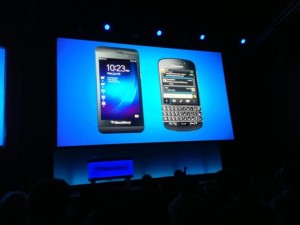Canadian smartphone users stepping up; U.K. sales do well

They may not have been standing in long lines, but BlackBerry loyalists looking to get their hands on the brand-new Z10 on Tuesday were just as excited as any iPhone user has ever been about a product launch.
“We’ve been waiting a long time for it,” said Kennedy Lys, a 22-year-old Mount Royal University student who went shopping the second his classes were over. “All of my friends know how excited I am … I feel giddy.”
Lys – like many others across Canada who rushed to buy the new touch screen device on its first day of availability – has never fallen out of love with the BlackBerry, even after the former Research In Motion (now known solely as BlackBerry) fell on hard times. After years of dominating the smartphone industry, RIM lost market share to Apple’s iPhone as well as numerous Android devices that boasted flashier devices and a wider variety of apps. The launch of the new devices – a keypad version will become available in April – is widely seen as a make or break moment for BlackBerry.
Debi Andrus, assistant professor of marketing at the University of Calgary’s Haskayne School of Business, said the Canadian company faces a tough challenge.
“At minimum, they have to keep their base,” said Andrus, adding it’s crucial for the company to retain or win back business users of their devices.
However, Andrus said BlackBerry is trying to draw new users to its phones with features that appeal to a young, consumer audience.
It has greatly expanded its selection of apps, for example, and improved its camera feature. The new devices are powered by a whole new operating system.
“It’s not always easy to go from one (customer base) to the other like that, but they’re having to do both. Because even their loyal business users don’t want two phones, one for business use and one for personal use,” she said.
Darrell Graham, vice-president of Western Canadian distribution and sales for Rogers Communications, said “thousands” of customers have pre-registered for a new BlackBerry phone – a level of interest that compares favourably to any previous BlackBerry launch.
“It’s been some time since we’ve had anything really exciting on the RIM front,” Graham said. “But having been in the business for some time and having been through several RIM launches in the past, this certainly would stack up against – if not be the most exciting – launch they’ve ever had.”
Some analysts have been concerned BlackBerry’s launch came too late to recover the lustre of its name. The BlackBerry 10 devices were originally due for release last year, but chief executive Thorsen Heins decided they still weren’t ready for the public, even though they had been delayed once before.
It was one of the difficult decisions the CEO had to make when he took over the top position last January from then co-CEOs Jim Balsillie and Mike Lazaridis.
He also dug deep into the company’s operations to cut costs, which included closing manufacturing facilities and making thousands of job cuts.
But anecdotes from the U.K., where the phone launched last week, suggest the new BlackBerry is selling at a steady pace.
Following an increase of more than 12 per cent on Monday, the company’s stock was up again Tuesday in Toronto gaining six per cent or 95 cents to close at $15.94.
Still, Heins is not ready to celebrate just yet. “I think we’re off to a good start,” Heins told the Financial Post. “Now we need to see how does this trend stabilize and where do we go from here. A week is not a success yet.”
The Z10 is expected to typically sell for $150 on a three-year contract. U.S. customers won’t be able to get the device until March.
A second BlackBerry featuring the company’s famous physical keyboard is set to launch later this spring.
According to research conducted by IDC Canada, BlackBerry had just 4.5 per cent of the Canadian smartphone market in the fourth quarter of 2012 – less than a 10th of Apple’s market-leading 47.5 per cent. Samsung was second with 32.7 per cent, followed by LG with 4.6 per cent.
Heins said he is getting the sense from carriers there is “room for BlackBerry” and more competition in the market.
“I have a different value proposition,” he said. “I’m confident that we will have a clear place in the smartphone mobile computing domain.”
Mobile OS market share
Mobile OS market share Once a powerhouse in North America, BlackBerry is hoping for a resurgence with its new handsets A look at the North American mobile OS market share from 2009 to 2012.
Amanda Stephenson, Calgary Herald; With Files From The Financial Post And The Canadian Press
Published: Wednesday, February 06, 2013





